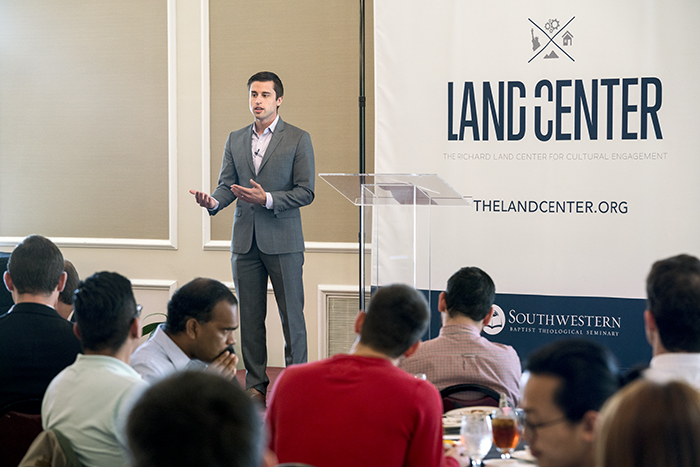Search for a higher purpose bridged gap between faith and finance

John Cortines grew up as a saver. As a child, he regularly dumped his piggy bank and recorded his “net wealth” of pennies. He saved money from mowing lawns and finished high school with $10,000 in savings—and graduate school with over $100,000. Saving—and growing—his wealth was his goal.
A graduate of Harvard Business School and King Abdullah University of Science and Technology in Saudi Arabia, Cortines was a highly paid young petroleum engineer at Chevron, on the fast track to wealth in his 20s. He had a growing family and all that he wanted or needed. He expected to retire at 40. “And that’s when God started to change the narrative,” he recalled.
As speaker at Southwestern Seminary’s Land Center luncheon, March 29, Cortines, co-author of God and Money: How We Discovered True Riches at Harvard Business School, related how he turned his focus from wealth to God. When spiritual dilemmas led him to question the intersection of faith and money, he used his analytical thinking skills to ultimately resolve that active giving paves the way for a life that serves God.
During his graduate school days at Harvard, he and six fellow believers met regularly for support and fellowship. With fellow student and believer Gregory Baumer, Cortines enrolled in a class at Harvard Divinity School to help him evaluate his priorities in life. There, he began to realize that he was prioritizing wealth over all else.
“I was forming a lot of my personal identity in building wealth,” he said. “It had become an idolatry of possessions.”
Scripture brought Cortines and Baumer to the conclusion that they should give the majority of their money away to those in need. “We were building a new model around a servant mindset.”
To fulfill a class assignment, Cortines and Baumer surveyed more than 200 Harvard MBA students, asking them to explain their feelings about charitable giving. The two were intrigued when the majority of generous givers said that as they allocated their earnings to causes, their wealth multiplied. Their research grew into an 80-page research paper, and, eventually, became the book God and Money.
“We thought we were writing a term paper,” Cortines said. “It became our guide to live by.” Their text explores “how you can reap the rewards of radical generosity.”
“We came into the project asking ourselves how much money we needed to give,” Cortines said. “But the servants of God we were questioning were asking themselves, ‘How much do we need to keep?’”
Cortines and Baumer vowed not to escalate their lifestyles as their wealth continued to rise. By then, Baumer was a 25-year-old analyst at a Boston private equity firm making $250,000 a year. Cortines was earning six figures as a petroleum engineer in Louisiana, comfortable in the knowledge that his wealth would expand substantially, and so would his giving. He vowed to give at least half of his earnings away. “That’s when God threw me a curve ball.”
Cortines was asked to leave his lucrative position to join the leadership team of a giving-focused nonprofit. The job offer confounded Cortines. “I was wrestling between affluence and generosity,” he said.
Faced with giving up his high salary, he and his wife cried for weeks. “But I felt God say to me, ‘My son, you need to let it go.’”
Now chief operating officer at the nonprofit Generous Giving, Cortines says the role has brought “freedom to our lives and depth to our marriage as we never experienced before. I was delivered out of the role of being a servant to money.”
Cortines’ focus is now on “saving people, saving the lost and strengthening believers. Those are the three buckets I allocate money to,” he said. “We found that as we gave to these areas, our hearts followed, and we came alive to the Gospel. Now, we’re seeking first the Kingdom.”



